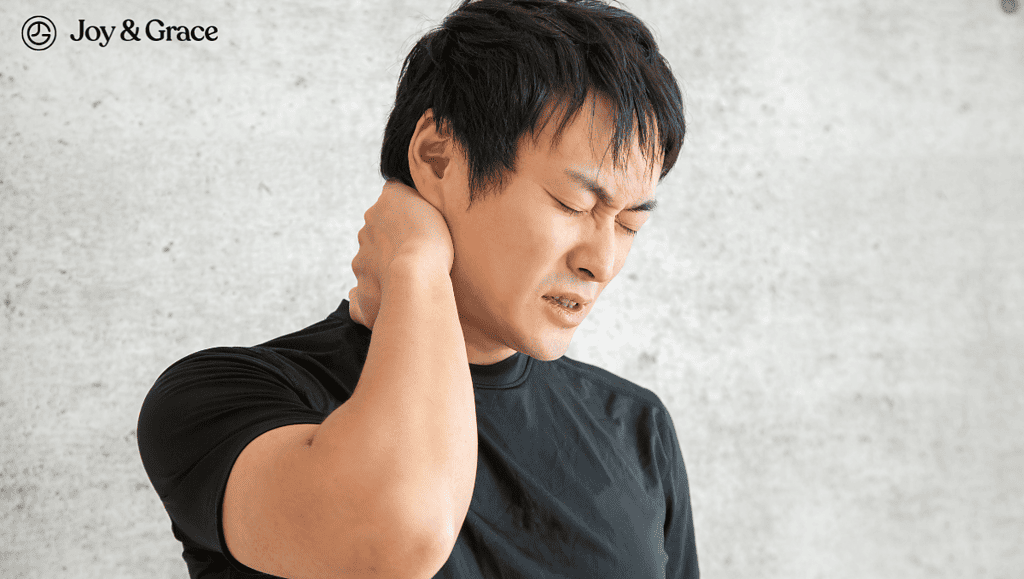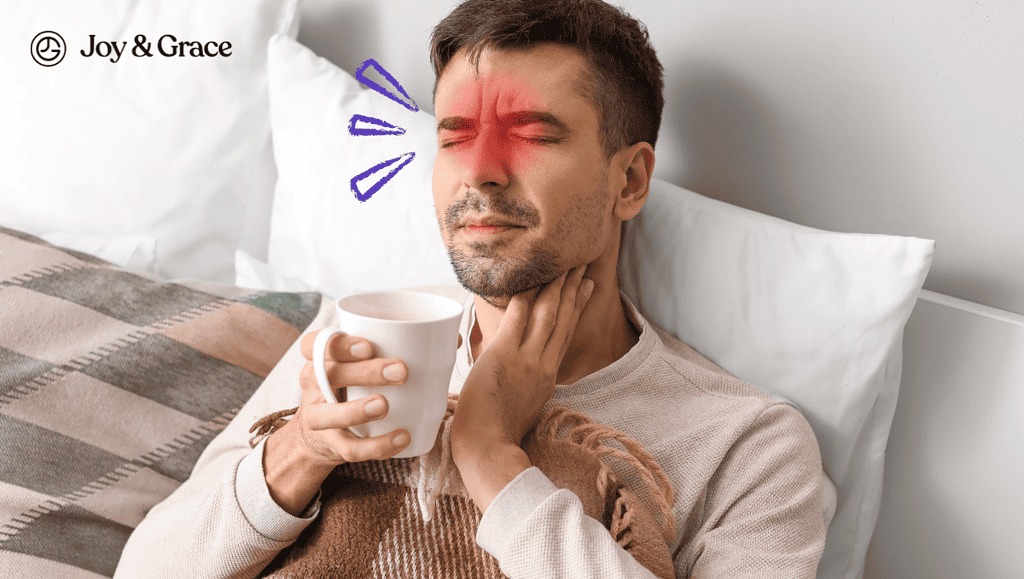If you're reading this, then it's likely that you've experienced nighttime neck pain. It can be a scary thing to experience and frequently leads to further health problems if not addressed.
In this article, we'll discuss the causes of nighttime neck pain and how best to address them so that you can have better quality sleep at night.
Why Does My Neck Hurt at Night?
In most cases, the reasons behind the pain are relatively harmless and include issues like:
- Pillows and mattresses: Your pillow or mattress may not properly support your neck. An unsuitable pillow that's too high or flat can strain your neck muscles.
- Poor Posture During The Day: Spending hours hunched over a computer or staring at your phone can strain your neck muscles. This strain can manifest as pain at night when you finally relax and feel the tension.
- Stress: High stress levels can lead to muscle tension, including in the neck area. As you wind down, this tension can cause significant discomfort.
- Exercise Habits: Lack of regular exercise or sudden, intense exercise can lead to a sore neck. Your muscles may be either too stiff or overworked.
Most of these triggers can be alleviated with lifestyle adjustments.
However, there might be an underlying medical issue at play if neck pain persists or is present along with other symptoms. Those include conditions like:
Let's delve into how biological changes at night can worsen neck pain and examine these medical issues that often intensify it after dark.
Why Does Neck Pain Get Worse at Night?
Decreased Cortisol Levels
One key component lies hidden in the hormonal balances within the body. At night, our bodies make less of the anti-inflammatory chemicals that control how we react to pain. This reduced level might be the root of the intensified neck pain experienced during sleep hours.
Circadian Cycle
According to research, the circadian cycle, which is our body's 24-hour clock, may also affect how bad the pain is. This means that our pain may change as our bodies go through different states of sleep and wakefulness. For some people, this might translate to the pain being worse at night.
Body Temperature
Your body temperature greatly affects how well you sleep, and it may also worsen your neck pain at night. It's fascinating that when you prepare for sleep, your body begins to cool down, primarily due to shifts in your blood flow.
Research indicates that sleep typically commences during the period when your body temperature is lowering most rapidly. Some people may have trouble with this process, especially those with cold hands and feet.
If you have trouble falling asleep, this can throw off your body's natural rhythms, worsening your neck pain at night.
Keeping your bedroom warm and cozy can help keep your neck pain from worsening at night. So, ensuring that you're nicely tucked in for a good night's sleep can make a real difference in managing neck pain.
Specifics of Some Medical Conditions
As mentioned earlier, neck pain that worsens at night or lasts for a long time could be a sign of a true health problem. Some of these conditions included:
- Arthritis,
- Cervical radiculopathy and
- Sleep apnea
1. Arthritis: Why Is Arthritis Neck Pain Worse At Night?
Inflammatory conditions often worsen when you rest because being still can make you feel stiff and uncomfortable.
This is also consistent with the increase in the stress hormone cortisol, which also increases at night, as discussed earlier.
However, it's important to remember that not all neck pain at night is caused by arthritis. Typically, osteoarthritis will also present with other symptoms, including:
- Joint tenderness
- Reduced flexibility
- Grating sensation or sound in the joints
- Swelling around the affected areas
These signs, along with ongoing neck pain, may mean that you need to see a doctor to rule out osteoarthritis.
2. Cervical Radiculopathy: What Does a Pinched Nerve in the Neck Feel Like?
Cervical radiculopathy, where a nerve in the neck is pinched, can result in severe neck pain at night. Lying down can put more pressure on a nerve that is already pinched, making the symptoms worse and making you feel more pain.
If you think your pain might be caused by cervical radiculopathy, common signs to watch for include:
- Sharp Pain
One of the most noticeable symptoms is a sharp pain in the neck, which can radiate into the shoulder, down the arm, or even extend to the hands. This pain usually follows the path of the affected nerve and can intensify with specific neck movements or positions.
- Numbness or Tingling
Along with pain, you may also experience numbness, tingling, or a prickly sensation in the neck, shoulder, arm, or hand. This happens due to nerve irritation.
- Weakness
The affected nerve may also cause muscle weakness in the arm or hand. This could impact your grip strength or arm skills, making it hard to perform regular tasks.
- Limited Movement
In some cases, neck mobility might be restricted due to pain and discomfort, affecting your ability to turn or nod.
To manage this condition and get better sleep, it's essential to be aware of these signs and get professional help for a diagnosis and treatment.
3. Sleep Apnea: Why Does Neck Pain Worse at Night?

Sleep apnea is a disease that causes breathing to stop or become shallow during sleep. It may be related to neck pain in a way you wouldn't expect. Often overlooked, this condition can be a hidden source of neck discomfort that intensifies at night.
Like a chain reaction, the heavy snoring that comes with sleep apnea makes the muscles in the neck work too hard, which causes pain and strain.
Additional theories about the link between sleep apnea and pain suggest that those with obstructive sleep apnea might also be more sensitive to pain.
This is thought to be because sleep apnea can lead to fragmented sleep and reduced oxygen levels in the blood, known as hypoxemia.
However, it’s important to note that not everyone who snores has sleep apnea and not all those with sleep apnea snore.
If you're concerned that sleep apnea may be the cause of your neck pain at night, here are some symptoms to be aware of:
- Excessive daytime sleepiness, even after a full night's sleep
- Episodes of breathing cessation witnessed by another person
- Abrupt awakenings accompanied by shortness of breath
- Awakening with a dry mouth or sore throat
- Morning headaches
- Difficulty concentrating during the day
- Experiencing mood changes, such as depression or irritability
- High blood pressure
- Decreased libido
How Should I Sleep to Relieve Neck Pain?
Alleviating neck pain significantly hinges on enhancing sleeping habits. Since anti-inflammatory hormones are lower at night, good sleep hygiene can help handle pain and improve health. A study by the American Thoracic Society also supports this.
Here are some good sleeping habits that you should work on:
- Maintaining a Sleep Schedule
Uphold a regular sleep-wake rhythm, including weekends. This works with your body's natural clock, which could help your health and sleep.
- Relax Before Bed
Try incorporating relaxation activities, like reading or a warm bath, into your pre-sleep routine. These help your body transition into sleep mode.
- Limit your time in front of a screen
Electronic devices give off blue light, which can stop melatonin production, a hormone that controls sleep. Designating at least an hour of screen-free time before bed can prove beneficial.
Along with good sleep habits, the way you sleep and the pillows you use can make a big difference in how well you deal with neck pain.
For instance, sleeping on your back with the proper pillow support can help you keep your neck's natural curve, which will reduce stress. However, optimal choices may vary among individuals.
The upcoming sections will provide detailed insights into the best positions and pillows to help alleviate neck pain.
What is the Best Position to Sleep to Avoid Neck Pain?
Your sleep posture matters for both quality rest and neck pain relief. Choosing a position that maintains your spine's natural alignment may lessen pain.
Helpful sleep positions to consider are:
- Back Sleeping
With a pillow that supports the natural bend of the neck in this position, the weight is spread out evenly, and the spine is straightened. It aids muscle relaxation and reduces the odds of neck pain. However, back sleepers must avoid high or stiff pillows, which might cause neck muscle strain.
- Side Sleeping
This is another influential position that can offer relief from neck pain. The key is ensuring the pillow height allows for a neutral position of the neck, aligning the nose with the body's center.
Research suggests that this position is not only effective for alleviating neck pain but may also help prevent other spinal issues.
- Fetal Position
Some people feel better when they lie on their side with their knees pulled up to their chest in the fetal position. This is especially true for people who have a damaged disc. By making the spaces between the vertebrae bigger, this pose can ease pain by lowering pressure on the spinal nerve roots.

While these poses are suggested as a starting point, it's important to change them to fit your needs for the best neck pain relief and comfort.
Stomach sleeping, on the other hand, should definitely be avoided.
Which Pillow Is Best for Neck Pain?
Picking the right pillow is very important for neck pain relief. But with so many choices, it can be a tough decision. Here’s a brief guide:
Material:
A study found that a viscoelastic polyurethane pillow (“memory foam pillow”) can ease severe neck pain. Because of how the material is made, this type of pillow can shape your head and neck, giving you much-needed support while sleeping.
Latex cushions are also often recommended.
Firmness:
Regarding pillow firmness, your pillow should ideally be soft but not overly so. The pillow must be soft enough to be comfortable and rugged enough to support your head correctly. Both sides of the pillow should offer even support, eliminating the chances of a “tilted” sleeping position.
Thickness or Height:
The thickness and height of the pillow are essential, too.
It shouldn't be too thick or too high, as this could strain your neck muscles. Ideally, your pillow should maintain the alignment of your neck with the rest of your body, mitigating any undue pressure on your neck.
Ultimately, the best pillow for neck pain varies between individuals and their comfort needs. Therefore, trying out different pillows before deciding which one best helps alleviate your neck pain is essential.
Remember that the best pillow should make you feel good, keep your head and neck in the right place, and support them well while you sleep.
Is It Better for Your Neck to Sleep Without a Pillow?
The dilemma of whether to sleep with or without a pillow to prevent neck pain is a common one.
While concrete research specific to pillow use and neck pain is lacking, this would be our recommendation:
Neck Injuries:
- With Pillow
If you have neck pain or are suffering from an injury, it would be best to sleep with a pillow.
This could help maintain proper spine alignment during sleep, offering relief and aiding in the healing process.
“A Pillow Makes My Neck Feel Uncomfortable”
- Pillow Adjustment
If you find that your pillow makes your neck uncomfortable, try changing it before giving up using it altogether.
Unsuitable pillows can disrupt sleep patterns, causing one to wake up with tension headaches or neck strain. Find one that’s firm enough to offer robust support for your neck but not so hard that it compromises comfort. This simple switch could improve your sleep, ease neck pain, and give you a better start to your day.
Persistent Problems
- Without Pillow
If you've tried various pillows without success, then, as a last resort, you might experiment with sleeping without one.
This approach is not universally recommended but may relieve those who have yet to find comfort with any pillow.
Remember, these recommendations are a starting point. Listening to your body and consulting with a healthcare provider for personalized advice is essential.
How Do I Relax My Neck Muscles When I Sleep?

Getting a comfortable, restful sleep often comes down to the good sleeping habits discussed earlier.
But beyond these, there are also other ways to relax your neck muscles for improved sleep quality. Here are some science-backed tips:
Practicing Relaxation Techniques
There are several relaxation techniques that you can use to help relax your neck muscles:
Deep Breathing
- Find a quiet, comfortable spot.
- Close your eyes and take a slow, deep breath through your nose.
- Hold your breath for a moment, then exhale slowly through your mouth.
- Repeat this process for a few minutes, focusing on the rhythm of your breath to help your body, including your neck muscles, relax.
Progressive Muscle Relaxation
- Start in a comfortable seated position.
- Beginning with your neck muscles, tense them gently for a few seconds.
- Slowly release the tension, letting those muscles relax.
- Repeat this process with each muscle group in your body, moving from your neck down to your toes.
Gentle Neck Stretches
- Sit up straight in a chair with your feet flat on the floor.
- Slowly tilt your head towards your right shoulder until you feel a gentle stretch on the left side of your neck.
- Hold this position for a few seconds, then slowly turn your head back to the center.
- Repeat this on the left side, tilting your head towards your left shoulder.
- Do this a few times on each side, ensuring not to force or rush the movements.
Remember, individual comfort needs vary greatly. If you experience persistent pain or discomfort, it's always best to consult with a healthcare provider.
How Do I Stop My Neck From Hurting When I Sleep?
We suggest that you talk to a medical professional for personalized help if the pain doesn't go away despite your best efforts.
Some of the measures they might suggest include:
- Physical therapy Options
Ultrasound on the neck and muscle shoulders and guided neck exercises might help lessen neck pain.
- Manage Pain Effectively
If your neck pain doesn't go away even after good sleep hygiene and posture, over-the-counter painkillers might help for a short time.
Heat and cold therapy can be beneficial as well. An ice pack can help reduce inflammation and numb discomfort, whereas a heating pad may relieve muscular tension and improve flexibility.

But if the pain keeps up, it's a sign to look into more lasting solutions.
How To Stop the Neck From Hurting After Sleeping?
Experiencing neck pain after sleep can signal that your sleeping position or pillow isn't right for you. So, picking the right pillow and keeping your neck in the right position are two important things you can do to keep your neck from hurting.
In addition, you could also practice the following:
- Keep Adjusting Your Pillow
It's important to keep tweaking and checking your pillow setup. In one study, minor adjustments to the pillow were made over a few months. This consistent checking and tweaking made a big difference in reducing neck pain and improving sleep quality.
- Choose the Right Mattress
A supportive mattress is just as important as a pillow. It should support the natural curve of your spine. A mattress that's too soft or too firm can cause discomfort.
- Stretch Before Bed
Gentle stretching exercises before bed can help relieve tension and may prevent pain in the morning.
- Stay Hydrated
Dehydration can stiffen the discs between the vertebrae in your spine. Drinking plenty of water throughout the day can keep these discs supple.
- Consider Your Activities Before Bed
Avoid activities that strain the neck before bed, such as looking down at your phone or reading a book with your neck bent for a long time.
When to Seek Medical Help?
Experiencing neck pain now and then is quite common, but there are circumstances when it's essential to consult a medical expert. Recognizing certain 'red flags' can guide you when professional medical advice is necessary. Consider these key indicators:
- Ongoing Discomfort
If you have neck pain that won't go away even after resting and paying close attention to how you sleep and what pillow you use, you should see a doctor.
- Severe or Distressing Pain
You may need medical attention if your neck pain is severe or accompanied by arm or hand tingling, numbness, or weakness.
- Feeling Neck Pain After Your Night Shifts
If you work late-night shifts and often have neck pain afterward, it could be a sign of a sleep problem. It means your body's sleep rhythm might be disturbed because of your work schedule, and it could require medical help.
If you're in pain all the time, you should always talk to a doctor, especially if it's getting in the way of your normal tasks.
- Pain is interfering with daily activities and sleep
When pain begins to interfere with your daily activities and sleep, it's a sign that your body is struggling to cope.
In these situations, you need professional help immediately to figure out what's causing the pain and how to treat it effectively.
- Accompanying symptoms
Get medical help right away if your neck pain at night is followed by numbness, weakness, tingling down your arms or hands, or headaches that won't go away.
These could indicate a more serious underlying condition requiring timely intervention.
In addition, if you snore or have been diagnosed with sleep apnea, you might want to have it checked to relieve the chronic neck pain.
While it's essential to manage minor neck pain at home initially, listening to your body's signals is equally important.
You should see a doctor if the pain lasts for a long time, is severe, is linked to specific tasks, or is accompanied by other worrying symptoms.
It's always better to err on caution and promptly address any concerns.
Takeaway
Nighttime neck pain can disturb your peaceful sleep, making you feel worn out and upset during the day. Understanding why this happens and using practical strategies can bring real relief.
Some easy changes can make a big difference and help ease the pain. These include changing your sleep, choosing the right pillow, sticking to a regular sleep plan, and relaxing before bed.
But you should see a doctor if you have neck pain that won't go away or has high intensity. This is especially true if you also feel neck stiffness, weakness, or tingling in your hands or arms. This could signify bigger health issues that need a doctor's care.
Remember, a good night's sleep isn't a luxury - it's a key part of staying healthy and feeling good. Don't let nighttime neck pain steal your peaceful sleep. Be active in managing your discomfort; if you're unsure, always get advice from a healthcare professional. Here's to wishing you peaceful, pain-free sleep from this day forward.















